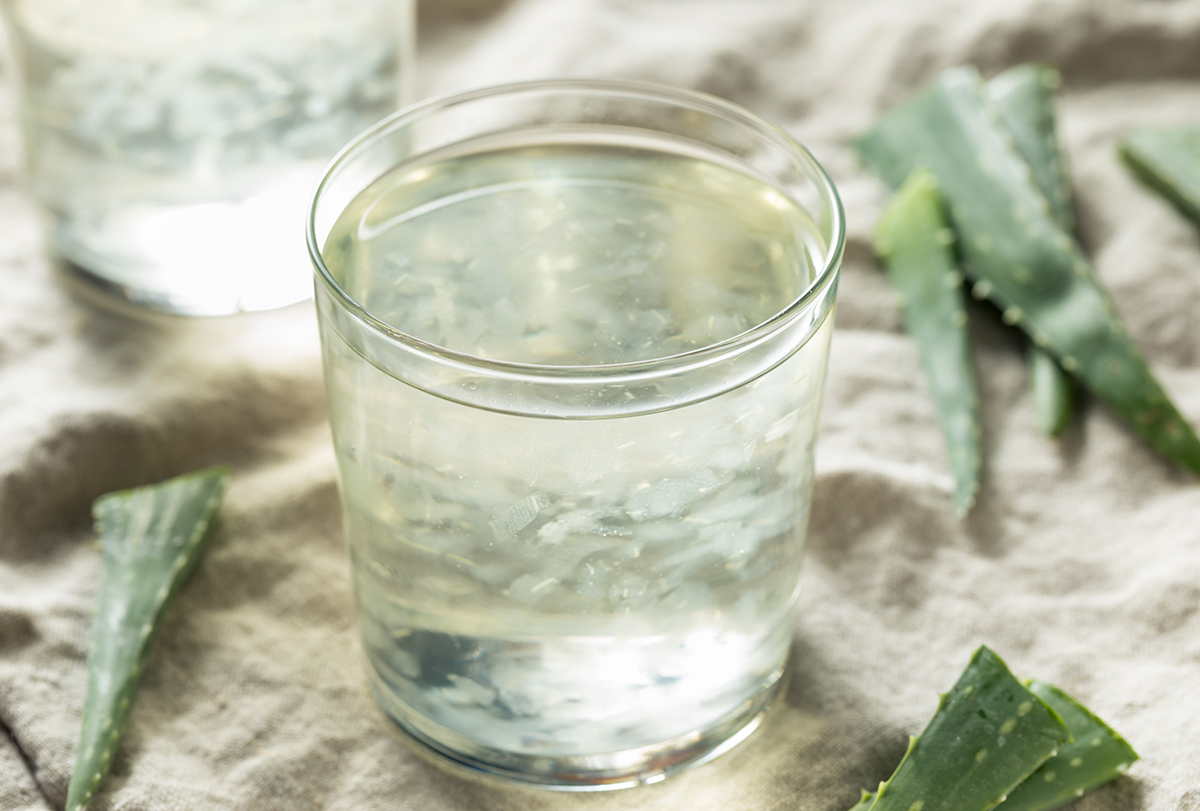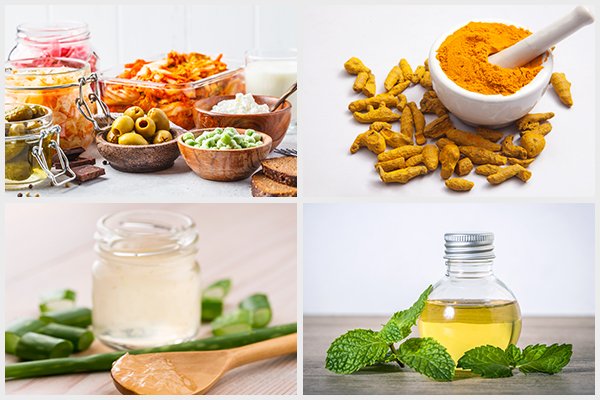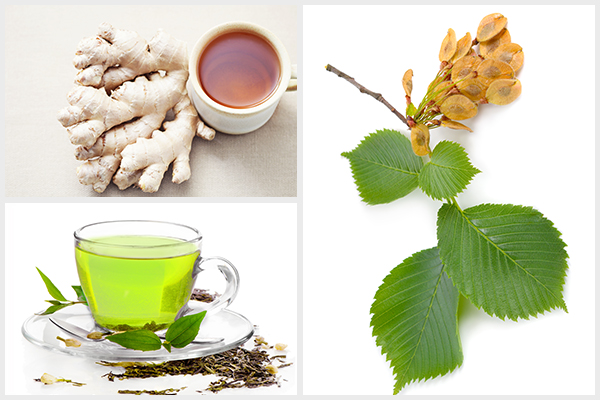In this article:
Living with Crohn’s disease can be challenging, as the chronic inflammation of the digestive tract leads to uncomfortable symptoms such as abdominal pain, diarrhea, and fatigue.

While medical treatment is essential for managing the condition, several home remedies can help alleviate the symptoms and improve your quality of life. (1)
This article will explore the natural remedies for Crohn’s disease that you can try at home to complement your medical treatment. These remedies are generally safe and cost-effective and may provide additional relief from the discomfort associated with the condition.
Home Remedies for Crohn’s Disease
The given home remedies can help relieve the discomfort of Crohn’s disease.
1. Add probiotics to your diet
It’s believed that the gut microbiome, the collection of bacteria in your intestines, plays a role in Crohn’s disease. Probiotics are good bacteria. They can help balance the gut microbiome and can be a potential therapy for Crohn’s disease, according to the Canadian Society of Intestinal Research. (2)(3)
Moreover, there’s evidence that probiotics can be helpful for other gut conditions such as irritable bowel syndrome and ulcerative colitis. However, when it comes to Crohn’s disease, it’s still not clear if probiotics are effective. But they’re definitely worth a try. (3)(2)
Note: Experts advise you to also include prebiotics in your diet such as apples and oats as they may be helpful for Crohn’s disease too.
2. Incorporate turmeric into your cooking
Turmeric is a spice with anti-inflammatory and antioxidant activities that can help calm down the inflammation in the gut caused by Crohn’s disease.
Research found that a compound called curcumin in turmeric can be helpful in the treatment of both Crohn’s disease and another condition called ulcerative colitis. (4)
3. Drink aloe juice every day
Aloe vera gel, extracted from the leaves of the aloe plant, has been used for centuries in traditional medicine. It’s been found to have some serious potential in treating gut inflammatory disease.
Aloe vera gel contains special chemical compounds (phytochemicals) that help reduce inflammation and promote healing in the colon. Research has given a thumbs-up for its use in inflammatory bowel diseases, which is a group of diseases that includes both Crohn’s disease and ulcerative colitis. (5)

4. Take peppermint oil supplement on doctor’s advice
Some researchers have found out that peppermint oil, which contains a lot of biophenols, can work wonders for people with Crohn’s disease, ulcerative colitis, and irritable bowel syndrome (IBS).
In a study, people with Crohn’s disease who took peppermint oil as a supplement had improved stomach problems and gastrointestinal symptoms. Additionally, peppermint oil reduced inflammation in the gut. (6)
5. Take a powdered slippery elm and water mix
The bark of slippery elm has some good antioxidant abilities. It fights off free radicals that can make Crohn’s symptoms even worse. Plus, when you take it, it forms a slippery coating in the intestines that serves as a protective covering that soothes the inflammation. (7)
Mix 1–2 teaspoons of slippery elm powder with an equal amount of water to form a paste-like consistency. Consume this slippery elm mixture before meals. Slippery elm capsules are also available.
6. Take boswellia capsules twice a day
A tree called Boswellia serrata is found in India, and people have been using its resin for ages in traditional medicine.
The boswellic acid extracted from the resin fights inflammation. In lab tests and studies with animals, it was found to block an enzyme called 5-lipoxygenase, which is responsible for inflammation in irritable bowel disease. (7)
It has been shown to reduce swelling and inflammation in the small intestine, which can bring some relief to people with Crohn’s disease. It may help people improve their symptoms with minimal side effects. (7)
Note: Look for standardized Boswellia serrata extract capsules or tablets. Aim for a product containing 300–500 mg of boswellic acid per dose. Typically, the recommended dosage is 1–2 capsules/tablets, two times per day.

7. Drink ginger tea every day
Ginger is a spice with antioxidant powers. Ginger and its component, zingerone, are good for your gut. They help calm down a factor in your body called NF-kB, which causes inflammation. (7)
Even though ginger is not a magical cure, it can be a helpful addition to your overall treatment plan for Crohn’s disease by consuming ginger tea.
8. Enjoy green tea in the morning and at night
Green tea is made from the leaves of Camellia sinensis. These leaves contain compounds called polyphenols, and one of them is called catechin.
These polyphenols act as powerful antioxidants, fighting off the markers that cause inflammation in your body. (7) Since inflammation causes most of the trouble in Crohn’s disease, green tea might be of help.
So, if you’re dealing with Crohn’s disease, consider adding a cup or two of green tea to your daily routine.
9. Add certain items to your diet

Certain foods have abilities to fight the inflammation associated with Crohn’s disease and make you feel better. Include them in your diet. (8)
- Fruits such as bananas and raspberries
- Squashes, soft and tender cooked carrots, and green beans
- Foods rich in omega-3 fatty acids such as fatty fish (salmon, tuna, and mackerel), walnut butter, chia seeds, flaxseed oil, and flaxseed meal
- Cooked and cooled starches such as potatoes, sweet potatoes, rice, and oatmeal
- Green veggies
10. Always stay hydrated

Dehydration can be a problem when you can’t drink enough fluids or when your body loses a lot of liquid. This can happen if you’re experiencing frequent diarrhea with Crohn’s disease. (9)
If you’re feeling dehydrated, here are a couple of things you can try:
- Drink water or fruit juice. But if you’re more dehydrated, you’ll need to replace the sugars and salts that your body has lost with ORS.
- Sports drinks can be helpful too. They contain some salts and sugars, which can help replenish what you’ve lost.
Stress Management for Crohn’s Disease
Dealing with Crohn’s disease can be tough, and it’s totally normal to feel anxious or down because of it. Here are some ways to help you cope and manage those feelings: (10)
- It can be really helpful to chat with your parents, friends, or even people who also have Crohn’s disease. They understand what you’re going through and can provide support.
- Take some time to unwind and focus on your breath. It can help calm your mind and body.
- Meditation can be helpful in reducing stress.
- Give yoga or Tai chi a try. These exercises are gentle and slow moving and are designed to promote relaxation, balance, and overall well-being.
Most-Asked Questions About Crohn’s Disease
How is Crohn’s disease categorized?
Crohn’s disease can be classified into three main patterns: primarily inflammatory, primarily stenotic (obstructing), and primarily penetrating (fistulizing).
The classification helps determine the appropriate treatment approach based on the specific clinical pattern. Over time, the primarily inflammatory pattern may evolve into either a stenotic or obstructing pattern or a penetrating or fistulizing pattern. (11)
Is Crohn’s disease contagious?
No, Crohn’s disease is not contagious.
Can Crohn’s disease be cured?
There is no known cure for Crohn’s disease, but similar to hypothyroidism and diabetes, it can be managed with treatments.
Can diet affect Crohn’s disease?
Yes, certain foods can trigger or worsen the symptoms of Crohn’s disease, so dietary changes can be helpful.
Does stress play a role in Crohn’s disease?
While stress doesn’t cause Crohn’s disease, it can exacerbate its symptoms.
Can Crohn’s disease be fatal?
Although it can be a serious condition, proper management and treatment can help prevent complications.
Does smoking affect Crohn’s disease?
Smoking can worsen the symptoms and increase the risk of complications in Crohn’s disease.
Can Crohn’s disease affect other parts of the body?
Yes, it can cause extraintestinal manifestations, such as joint pain, skin rashes, and eye problems.
Is surgery always necessary for Crohn’s disease?
Surgery is not always required, but it may be recommended for certain cases or complications.
Can Crohn’s disease be managed without medication?
In some cases, mild symptoms can be managed with lifestyle changes, but medication is often necessary for controlling inflammation.
Can children get Crohn’s disease?
Yes, children and adolescents can develop Crohn’s disease.
Is it possible to lead a normal life with Crohn’s disease?
Crohn’s disease is characterized by periods of flare-ups and periods of symptom relief. The disease can have varying severity among different individuals.
Effective medical treatments and, in some cases, surgical interventions are available to manage Crohn’s disease. These therapies aim to control symptoms and minimize complications.
With appropriate medical care, most patients with Crohn’s disease are able to function well and adapt successfully to their condition. They can maintain active and fulfilling lifestyles. (12)
Can Crohn’s disease go into remission?
Yes, periods of remission, where symptoms are minimal or absent, can occur with effective treatment.
What is the mortality rate for Crohn’s disease?
While Crohn’s disease can have a significant impact on quality of life, disease-related mortality is generally low. The leading cause of mortality in Crohn’s disease is related to gastrointestinal cancers, such as colon cancer and small bowel cancer.
Can acupuncture and biofeedback help with Crohn’s disease?
Acupuncture and biofeedback may help manage certain symptoms of Crohn’s disease, but they are not considered primary treatments for the disease itself.
Can Crohn’s disease be treated with exercise?
Exercise can have benefits for overall health, but it is not a cure for Crohn’s disease.
Final Word
While there is no cure for Crohn’s disease, incorporating home remedies into your routine may provide additional support in managing your symptoms. From mindful eating to consuming probiotics and turmeric, these natural approaches can complement medical treatment and help improve your overall well-being.
However, it’s important to consult with your healthcare provider before trying any new remedies to ensure they are safe and appropriate for your specific condition.
 Continue ReadingWhat Is Crohn’s Disease and How to Deal With It
Continue ReadingWhat Is Crohn’s Disease and How to Deal With It
- Was this article helpful?
- YES, THANKS!NOT REALLY


